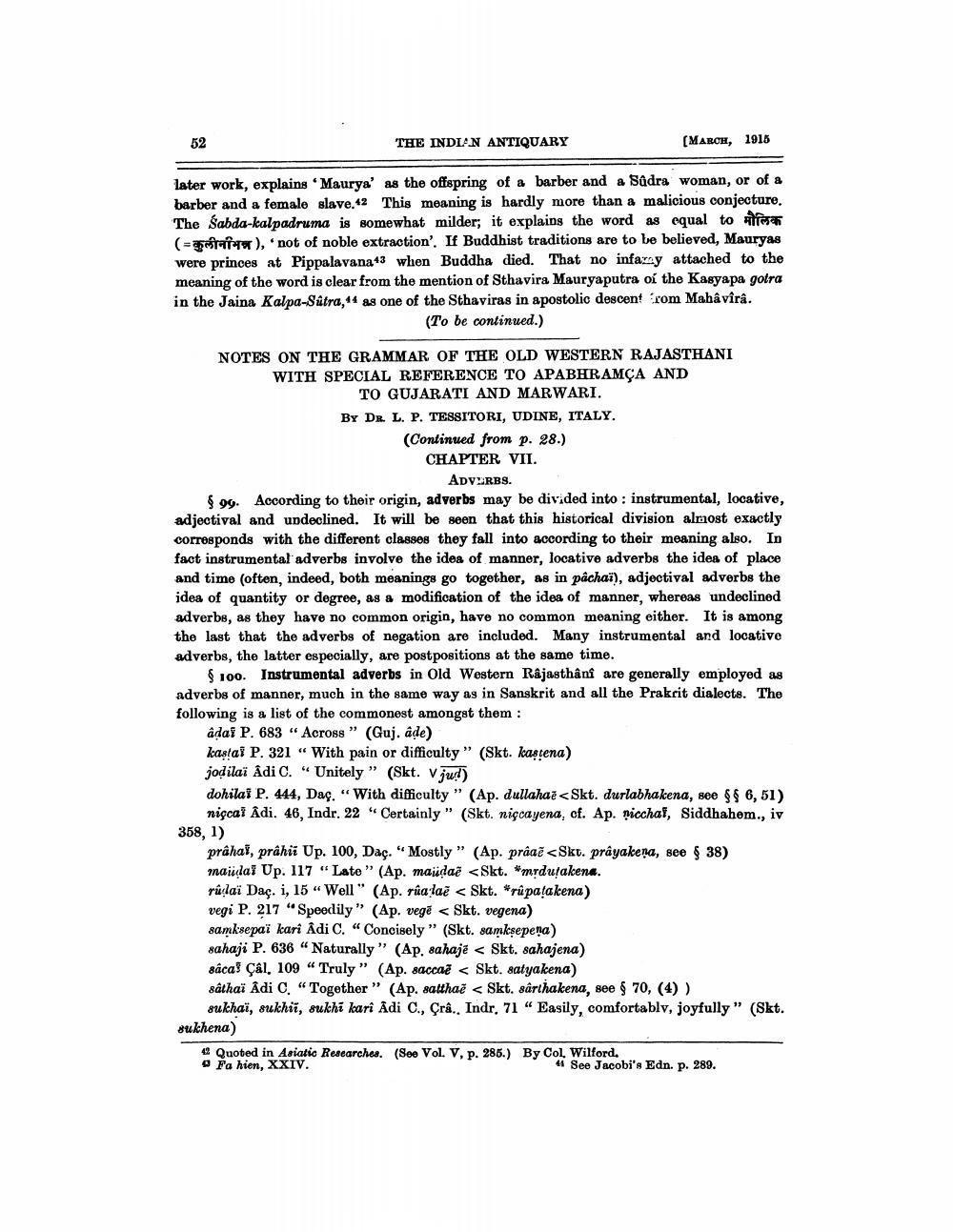________________
52
THE INDIAN ANTIQUARY
(MARCH, 1916
later work, explains · Maurya' as the offspring of a barber and a Sądra woman, or of a barber and a female slave.2 This meaning is hardly more than a malicious conjecture. The Sabda-kalpadruma is somewhat milder; it explains the word as equal to A (= raftw), not of noble extraction'. If Buddhist traditions are to be believed, Mauryas were princes at Pippalavana 13 when Buddha died. That no infaxay attached to the meaning of the word is clear from the mention of Sthavira Mauryaputra oí the Kasyapa gotra in the Jaina Kalpa-Sätra, 11 as one of the Sthaviras in apostolic descent from Mahavira.
(To be continued.)
NOTES ON THE GRAMMAR OF THE OLD WESTERN RAJASTHANI WITH SPECIAL REFERENCE TO APABHRAMÇA AND
TO GUJARATI AND MARWARI. BY DR. L. P. TESSITORI, UDINE, ITALY,
(Continued from p. 28.) CHAPTER VII.
ADV2RBS. $99. According to their origin, adverbs may be divided into : instrumental, locative, adjectival and undeclined. It will be seen that this historical division almost exactly corresponds with the different classes they fall into according to their meaning also. In fact instrumental adverbs involve the idea of manner, locative adverbs the idea of place and time (often, indeed, both meanings go together, as in pâchai), adjectival adverbs the idea of quantity or degree, as a modification of the idea of manner, whereas undeclined adverbs, as they have no common origin, have no common meaning either. It is among the last that the adverbs of negation are included. Many instrumental and locative adverbs, the latter especially, are postpositions at the same time.
$ 100. Instrumental adverbs in Old Western Rajasthani are generally employed as adverbs of manner, much in the same way as in Sanskrit and all the Prakcit dialects. The following is a list of the commonest amongst them :
adal P. 683 “ Across ” (Guj. ade) kastal P. 321 “ With pain or difficulty” (Skt. kastena) jodilai Ådi C. “Unitely” (Skt. Vjud) dohilal P. 444, Dag. "With difficulty " (Ap. dullahaē <Skt. durlabhakena, see $$ 6,51)
nigcal Adi. 46, Indr. 22 "Certainly " (Skt. niscayena, cf. Ap. ricchal, Siddhahem., iv 358, 1)
prâhal, prâhü Up. 100, Dac. "Mostly” (Ap. praaž <Skt. prayakena, see $38) maiidal Up. 117 "Late” (Ap. majdae <Skt. *mrdu/akena. rûlai Daç. i, 15 “Well" (Ap. rûa-lač < Skt. *rûpalakena) vegi P. 217 “Speedily" (Ap. vegë < Skt. vegena) samksepai kari Adi C. “Concisely” (Skt. samkepena) sahaji P. 636 “Naturally” (Ap. sahajë < Skt. sahajena) saca! Çal, 109 "Truly " (Ap. saccae < Skt. satyakena) sáthai Adi C. “Together” (Ap. satthaẽ < Skt. sarthakena, see $ 70, (4) )
sukhaï, sukhii, sukhi kari Adi C., Çrâ.. Indr, 71 “Easily, comfortably, joyfully" (Skt. sukhena)
Quoted in Asiatic Researches. (See Vol. V, p. 286.) By Col, Wilford. Fa hien, XXIV.
4 See Jacobi's Edn. p. 289.




